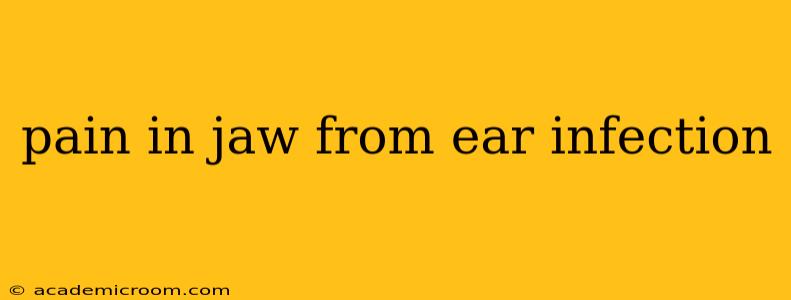Ear infections, while commonly associated with earache, can sometimes cause pain that radiates to the jaw. This referred pain occurs due to the intricate network of nerves connecting the ear, jaw, and surrounding structures. Understanding the connection between ear infections and jaw pain is crucial for proper diagnosis and effective treatment. This comprehensive guide will explore the causes, symptoms, and treatment options for this often-overlooked complication.
What Causes Jaw Pain from an Ear Infection?
The pain felt in the jaw from an ear infection isn't directly caused by inflammation within the jaw itself. Instead, it’s a result of the close proximity and shared nerve pathways between the ear and the temporomandibular joint (TMJ), the joint connecting your jaw to your skull. Inflammation and irritation in the middle ear can stimulate these nerves, leading to referred pain in the jaw. This is similar to how a heart attack can cause pain radiating down the arm; the pain is felt in a location distant from the actual source of the problem.
Several factors can contribute to the intensity and location of this referred pain:
- Nerve pathways: The trigeminal nerve (cranial nerve V) and the glossopharyngeal nerve (cranial nerve IX) innervate both the ear and the jaw. Inflammation or infection affecting these nerves can cause pain signals to be misinterpreted by the brain as originating from the jaw.
- Severity of the infection: A more severe ear infection, such as acute otitis media (middle ear infection) or otitis externa (swimmer's ear), is more likely to cause significant jaw pain.
- Individual variation: The exact location and intensity of referred pain can vary from person to person due to individual differences in nerve anatomy and pain perception.
What are the Symptoms of Jaw Pain from an Ear Infection?
While earache is the primary symptom of an ear infection, jaw pain often accompanies it and can manifest in various ways:
- Aching or throbbing pain: This is the most common type of jaw pain associated with ear infections. The pain can be mild to severe and may fluctuate in intensity.
- Pain with chewing or opening the mouth: This indicates involvement of the TMJ and can make eating or speaking uncomfortable.
- Earache: A persistent earache is usually present alongside jaw pain.
- Tenderness to the touch: The area around the ear and jaw might be tender to the touch.
- Fever: Fever often accompanies ear infections, especially in children.
- Hearing changes: You might experience muffled hearing or a feeling of fullness in the ear.
Does an ear infection always cause jaw pain?
No, an ear infection does not always cause jaw pain. While it's a possible symptom, many individuals experience ear infections without experiencing jaw pain. The occurrence of jaw pain depends on factors like the severity of the infection, individual nerve pathways, and pain perception.
Can ear infections cause jaw pain and headaches?
Yes, it’s possible for ear infections to cause both jaw pain and headaches. The same nerve pathways involved in referred jaw pain are also connected to areas of the head responsible for headache sensations. The pressure and inflammation from an ear infection can trigger headaches, often experienced as tension headaches or migraines.
How is jaw pain from an ear infection diagnosed?
Diagnosing jaw pain stemming from an ear infection typically involves a physical examination of the ear and jaw. Your doctor will inspect your ear canal for signs of infection, such as redness, swelling, or fluid buildup. They may also gently palpate the TMJ to check for tenderness or restricted movement. Sometimes, further investigations like tympanometry (measuring ear drum movement) might be necessary to assess the severity of the middle ear infection.
How is jaw pain from an ear infection treated?
Treatment focuses on addressing the underlying ear infection. Common treatments include:
- Antibiotics: For bacterial infections, antibiotics are often prescribed to fight the infection.
- Pain relievers: Over-the-counter pain relievers like ibuprofen or acetaminophen can help manage both ear and jaw pain.
- Ear drops: For some ear infections, ear drops containing antibiotics or steroids can be effective.
- Decongestants: Decongestants may help reduce swelling and pressure in the ear.
- Warm compresses: Applying a warm compress to the affected ear can provide temporary pain relief.
Important Note: This information is for educational purposes only and should not be considered medical advice. Always consult a healthcare professional for diagnosis and treatment of any medical condition, including ear infections and jaw pain. Self-treating can be dangerous and delay appropriate medical intervention. Prompt diagnosis and treatment are crucial to prevent complications.
